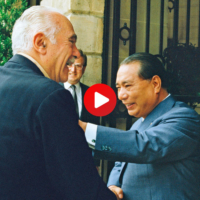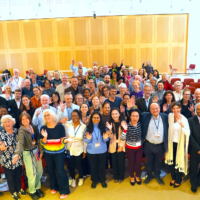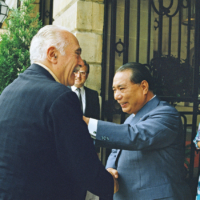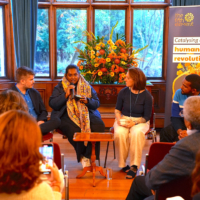Young activists and seasoned scholars from around the world gathered on Oct. 8 and 9 at Taplow Court near London to discuss the implications and possibilities of “human revolution” — positively directed inner change — a vital key, they claim, to tackling the daunting interlinked problems we face in today’s complex world.
Deep dialogues were held about the possibilities offered by inner transformation for systemic change at this conference co-organized by The Club of Rome and its Fifth Element program, Soka Gakkai, SGI-UK and the Centre for Applied Buddhism.
In his opening remarks, Carlos Alvarez Pereira, secretary-general of The Club of Rome, looked back over the more than 50 years since its landmark report “The Limits to Growth” was published. Although an alarm had been sounded, he said, humanity did not change course. “We thought we could master everything, but we still have to change our mindset. The fundamental element that we are still missing is a belief in the humanity and capacity of everybody, reflecting ourselves in others and engaging in mutual learning and mutual metamorphosis.”
Pereira outlined how the seed for The Club of Rome grew from co-founder Aurelio Peccei’s encounters first with China and other Asian cultures, then those of Latin America, leading him to question the prevailing Western paradigm of development.
The Taplow event celebrated the 40th anniversary of the publication of the dialogue between Peccei and Japanese Buddhist philosopher Daisaku Ikeda, “Before it is Too Late,” based on a series of discussions that began in the mid-1970s.
Peccei and Ikeda’s conclusion was that the fundamental solution to the world’s entangled environmental and social problems would have to come from within human beings themselves. Ikeda stated, “Solutions cannot be sought in technical and material revolutions outside man, but must be found in a reformation of humanity from within.”
Peccei concurred, elaborating: “This dormant human potential is scientifically recognized. It exists, packed in myriads of neurons inside our brains. … The primary goal of the human revolution, and by far the most important outcome to be expected from it, is the full development of our innermost capacities.”
Both were optimistic about this untapped potential, but they had differing views on how to unleash it. Peccei called for a new humanism, seeing this as a cultural movement, whereas Ikeda understood human revolution as a spiritual process that could activate the deepest level of human consciousness to overcome what Buddhism terms the “three poisons” of greed, anger and foolishness, and instead tap our highest qualities of wisdom, courage and compassion. He also saw holistic, humanistic education as a way to achieve the same goal.
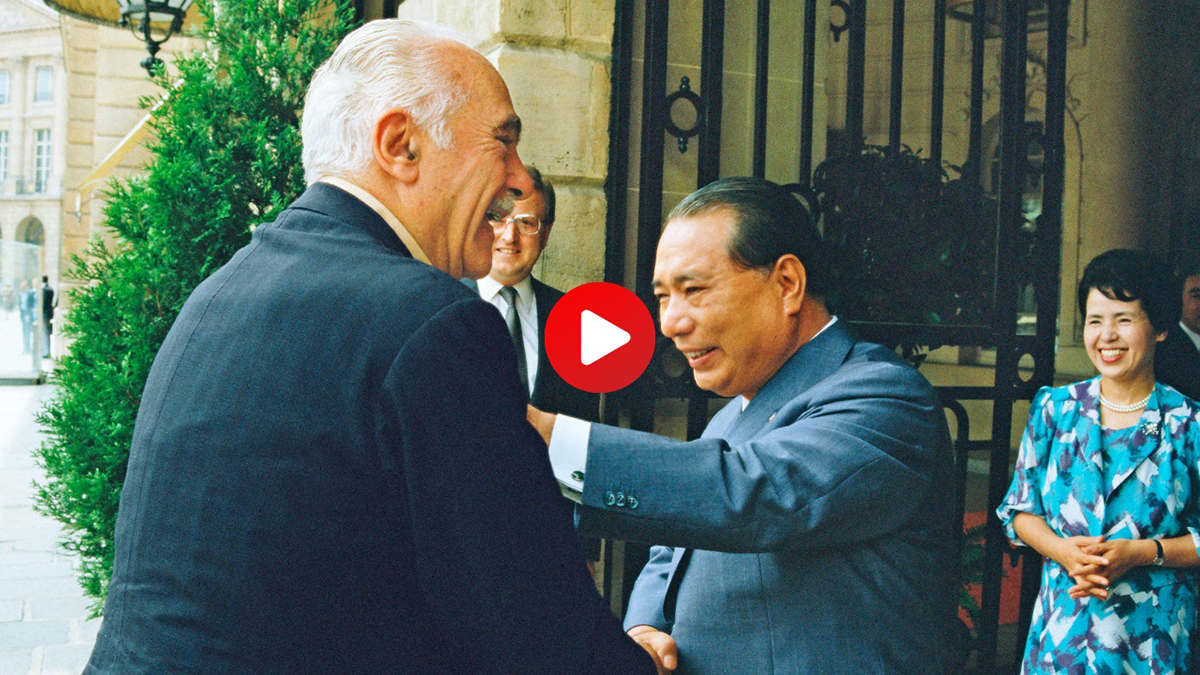
Exploring the topic of human revolution at the October event, Alice Ferrario of the Senzatomica antinuclear campaign promoted by the Italian Buddhist Institute Soka Gakkai described how they address the issue of nuclear weapons abolition by probing the attitudes that lie behind these ultimate weapons of mass destruction. Ferrario referenced Ikeda’s statement that the real enemy we must confront is not nuclear weapons themselves, but the ways of thinking that justify them; the readiness to annihilate others when they are seen as a threat or as a hindrance to the realization of our objectives.
At the opposite end of the spectrum of human possibility, the unleashing of compassion, kindness and love was identified by several speakers as key to restoring our connections with ourselves, with others and with the natural world of which we are part.
The process of inner change, or the revealing of positive potential known as human revolution, may start from within a single individual, but it inevitably leads in the direction of connection and widening the sphere of our concern to include other people and the community of life. Examples abound of how a broad process of societal change can be sparked by one person’s conscience propelling them to action, from Mahatma Gandhi to Rosa Parks.
This idea was further explored recently in an interview by Club of Rome Co-President Sandrine Dixson-Decleve: “A human revolution in the 21st century entails an understanding that there is no inner development for broader societal change, or possibility of a human revolution, without deep systemic transformation. This would enable individuals and a human collective to create a society that shifts from the ‘me’ to the ‘we’ and from the ‘ego’ to the ‘eco.’”
The Taplow conference demonstrated what richness there is in the imagination and creativity of young people, and the possibility of building cooperation from heartfelt dialogue that generates relationships of respect and trust. Louis Klein, secretary-general of the International Federation for Systems Research, who facilitated the main panel discussion, referred to human revolution as “the process of becoming more human.”
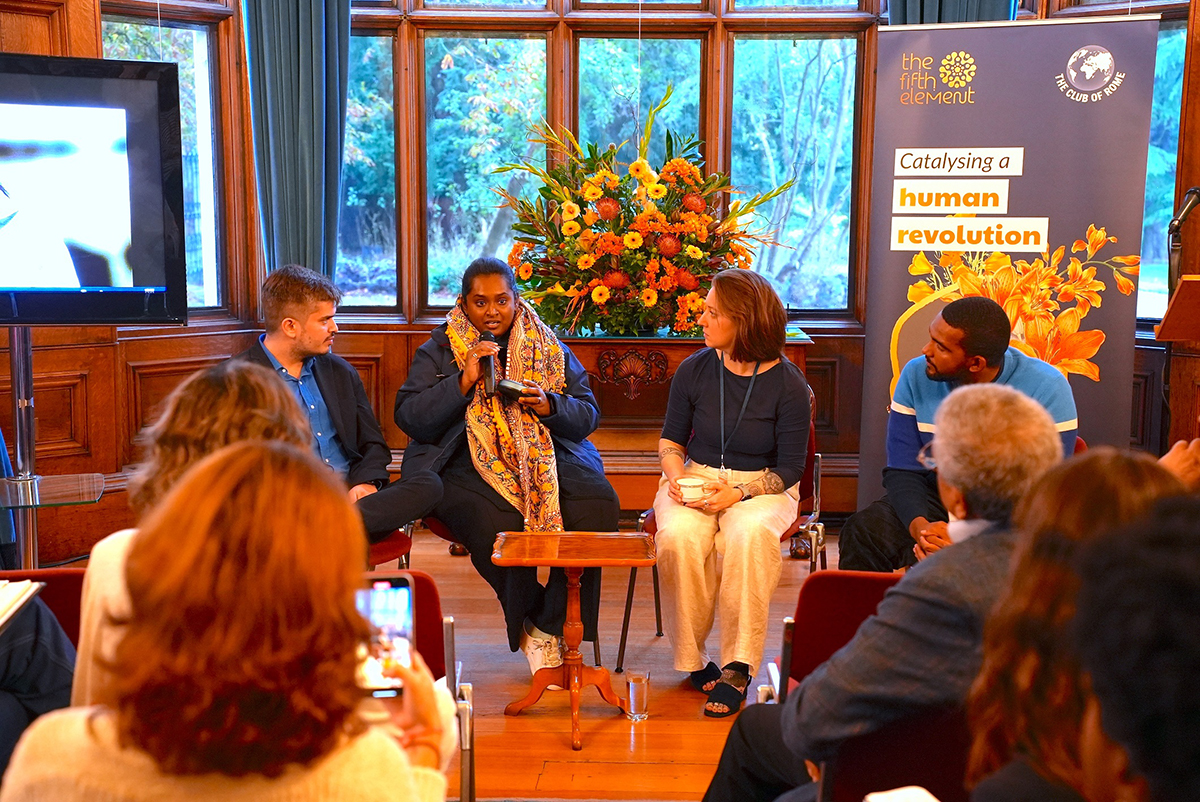
In the words of Ikeda: “The transformation from a self-centered way of life to one dedicated to the well-being of others is the process of human revolution. This is a revolution that can start here, now — in the heart of every one of us.”




